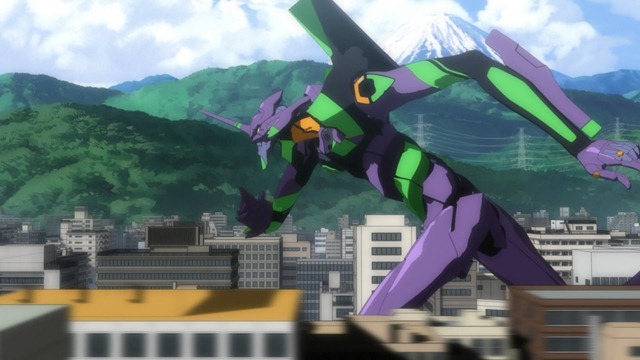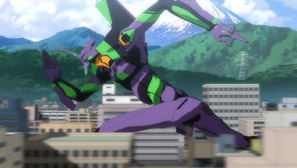Fifteen years after creator Hideaki Anno and Studio Gainax attempted to put the final word on the giant robot genre, Evangelion is still going. Neon Genesis Evangelion, the television show that turned a generation of viewers onto the wonders of Japanese anime, continues to hold a place in the hearts of many anime viewers. This was only intensified by the release of Evangelion 1.0: You Are (Not) Alone, the first of a four-part theatrical ‘rebuild’ of the original series. Where that film essentially retold the events of the early episodes of the TV series, Evangelion 2.0: You Can (Not) Advance truly takes off on its own tangent.
Picking up shortly after the events of the first film, the audience is introduced immediately to a new Evangelion pilot, Mari Illustrious Makinami and a mysterious experimental new Eva. Meanwhile, Shinji Ikari is attempting to bond with his father amidst the imminent destruction of life on Earth at the hands of the Angels. At a critical moment, Unit-02 and its cocky pilot Asuka Langley Shikinami arrive to show the Japanese arm of NERV how it is done. Rei Ayanami, the first of the Eva pilots and a seemingly otherworldly recluse, slowly begins to emotionally connect with the people around her. When disaster strikes in multiple places around the world, Shinji must decide what is important to him and whether or not to be the master of his own fate.
Evangelion 2.0: You Can (Not) Advance immediately distinguishes itself as a unique and powerful entry in the series. Filled with a number of familiar elements, not least of which are the character relationships and the Angels who attack Tokyo-3, Evangelion 2.0 is unabashedly made for the fans. Indeed, if you have not seen the first film – and some might even argue the original series – you will certainly miss out on much of the nuance of this episode. However, this is by no means a mere retread of the series in the way that the first film was. Viewers familiar with the classic episodes will immediately find themselves unsure of this new world, where literally anything can (and probably will) happen to the beloved characters. I had not expected to actually mutter a few ‘Wows’ throughout the film, but the narrative really sticks it in and breaks it off. Writer/director Hideaki Anno is not taking any prisoners this time.
The threat is all the more real to the main cast as Evangelion 2.0 does something that the original series was quite good at: developing character. The film quite cleverly establishes Shinji and his father together at the grave of Shinji’s mother, the one thing that keeps them simultaneously together and apart. Throughout the film Shinji attempts to rebuild his relationship with his dad, desperately craving the approval he has never received from the hard taskmaster. Similarly, Rei slowly begins to build her own bridges with Shinji, and attempts to help Shinji in his own quest. The bond becomes incredibly important in the film’s dramatic and literally uplifting conclusion, with Shinki Ikari finally paying attention to the motto from Zombieland: “Nut up, or shut up”. Evangelion 2.0 is about character, albeit with some absolutely amazing battle sequences (the final one may be impossible to top), and it is hard to dilute the central theme of finding connections in the world.
Remaking popular series is nothing new, yet fans and critics alike have justifiably questioned the need for these new theatrical versions of the series that for many defines Japanese anime. The original story worked incredibly well, and despite a confused denouement over several releases, continues to work to this day. Harsh critics would be forgiven for seeing this as a marketing exercise, especially with the introduction of no less than two new (highly marketable) characters, and far more fanservice crammed into every frame than humanly possible. Asuka has a new plug suit that leaves little to the imagination, and these will no doubt be hot-selling PVC figures until the end of time.
Visually, the film does take it up a notch, with the CG animation seamlessly integrating with the traditional 2D kind, giving the world a visual brilliance that frankly dwarfs the already impressive visuals from the original series. Yet this is something of an antithesis to the recent retread of the similarly popular Fullmetal Alchemist (in Fullmetal Alchemist: Brotherhood). Where that series attempted a more faithful manga adaptation than its original series, the Evangelion rebuilds are all about rethinking the concept from the inside out. Given the direction and conclusion of this second film, it is hard to imagine where two subsequent entries have to go!
Evangelion 2.0: You Can (Not) Advance reminds us of why we love watching movies. The enduring enthusiasm for this series was evident in the fans who turned up to a sold-out Australian premiere at Dendy’s Newtown Cinema last night. The reaction to the little tease at the end of the credits for Evangelion 3.0 was indicative of the excitement about the new direction this long-running series is taking. Australian fans will get to enjoy the film theatrically during September’s Reel Anime 2010, and we will no doubt see an Australian DVD and Blu-ray edition (of the 2.22 version, no less) in the very near future from Madman Entertainment.
Overall rating: ★★★★








No Responses